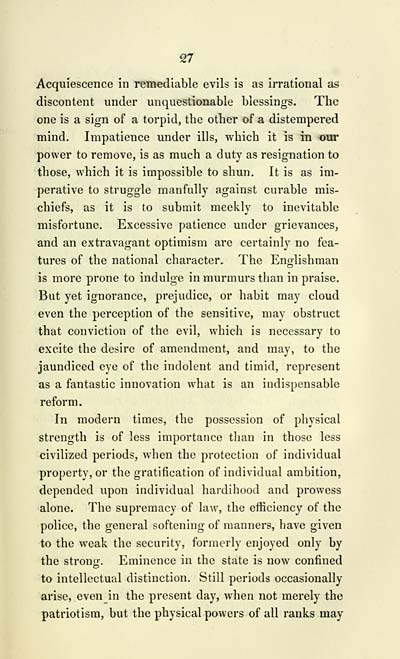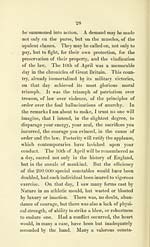J. F. Campbell Collection > Address to the middle classes upon the subject of gymnastic exercises
(33)
Download files
Complete book:
Individual page:
Thumbnail gallery: Grid view | List view

27
Acquiescence in remediable evils is as irrational as
discontent under unquestionable blessings. The
one is a sign of a torpid, the other of a distempered
mind. Impatience under ills, which it is in our
power to remove, is as much a duty as resignation to
those, which it is impossible to shun. It is as im-
perative to struggle manfully against curable mis-
chiefs, as it is to submit meekly to inevitable
misfortune. Excessive patience under grievances,
and an extravagant optimism are certainly no fea-
tures of the national character. The Englishman
is more prone to indulge in murmurs than in praise.
But yet ignorance, prejudice, or habit may cloud
even the perception of the sensitive, may obstruct
that conviction of the evil, which is necessary to
excite the desire of amendment, and may, to the
jaundiced eye of the indolent and timid, represent
as a fantastic innovation what is an indispensable
reform.
In modern times, the possession of pliysical
strength is of less importance than in those less
civilized periods, when the protection of individual
property, or the gratification of individual ambition,
depended upon individual hardihood and prowess
alone. The supremacy of law, the efficiency of the
police, the general softening of manners, have given
to the weak the security, formerly enjoyed only by
the strong. Eminence in the state is now confined
to intellectual distinction. Still periods occasionally
arise, even in the present day, when not merely the
patriotism, but the physical powers of all ranks may
Acquiescence in remediable evils is as irrational as
discontent under unquestionable blessings. The
one is a sign of a torpid, the other of a distempered
mind. Impatience under ills, which it is in our
power to remove, is as much a duty as resignation to
those, which it is impossible to shun. It is as im-
perative to struggle manfully against curable mis-
chiefs, as it is to submit meekly to inevitable
misfortune. Excessive patience under grievances,
and an extravagant optimism are certainly no fea-
tures of the national character. The Englishman
is more prone to indulge in murmurs than in praise.
But yet ignorance, prejudice, or habit may cloud
even the perception of the sensitive, may obstruct
that conviction of the evil, which is necessary to
excite the desire of amendment, and may, to the
jaundiced eye of the indolent and timid, represent
as a fantastic innovation what is an indispensable
reform.
In modern times, the possession of pliysical
strength is of less importance than in those less
civilized periods, when the protection of individual
property, or the gratification of individual ambition,
depended upon individual hardihood and prowess
alone. The supremacy of law, the efficiency of the
police, the general softening of manners, have given
to the weak the security, formerly enjoyed only by
the strong. Eminence in the state is now confined
to intellectual distinction. Still periods occasionally
arise, even in the present day, when not merely the
patriotism, but the physical powers of all ranks may
Set display mode to: Large image | Transcription
Images and transcriptions on this page, including medium image downloads, may be used under the Creative Commons Attribution 4.0 International Licence unless otherwise stated. ![]()
| Early Gaelic Book Collections > J. F. Campbell Collection > Address to the middle classes upon the subject of gymnastic exercises > (33) |
|---|
| Permanent URL | https://digital.nls.uk/78249494 |
|---|
| Description | Volumes from a collection of 610 books rich in Highland folklore, Ossianic literature and other Celtic subjects. Many of the books annotated by John Francis Campbell of Islay, who assembled the collection. |
|---|
| Description | Selected items from five 'Special and Named Printed Collections'. Includes books in Gaelic and other Celtic languages, works about the Gaels, their languages, literature, culture and history. |
|---|

